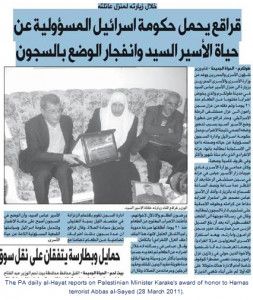With the collapse of peace talks between Israel and the Palestinians, the media’s focus has shifted to the Palestinian effort to win UN backing for an independent state. Newsweek reporter Dan Ephron spent a week with PA Chairman Mahmoud Abbas as Abbas traveled across Europe to win support for his UN-based efforts.
Unfortunately, Ephron’s report reads like a tribute to the PA leader, not the work of a professional journalist.
Ephron describes Abbas as capable of harsh criticism of American and Israeli diplomacy “usually followed by grandfatherly smile,” a leader who represents “the best hope for peace.” At the same time, Ephron brushes aside all of the obstacles the Palestinians have placed in the way of peace, including the ongoing PA incitement, which has contributed to an increase in violence from areas under Abbas’s control.
Ephron demonstrates his lack of objectivity about Abbas:
But Abbas, who has worked every angle for Palestinian statehood for 50 years, the last six as president, says he’s nearly out of time. “I cannot wait. Somebody will wait instead of me,” he tells me. “And I will not stay more.”
In the context of the current reality, it is stunning to learn that Abbas “has worked every angle for Palestinian statehood for 50 years.” Prior to his term as PA Chairman, he spent many years as a founding member of Yasser Arafat’s Fatah, the driving force behind the PLO which was then known primarily for its hijackings, murder and terror. He has a long history of turning a blind eye to the violence around him.
And it continues to this day. As recently as March 28, 2011, a minister in Abbas’s government presented a special honor to the family of the mastermind of the Passover Massacre, the deadliest suicide bombing of the Second Intifada. The attack took place on March 27, 2002 at the Park Hotel, killing 30 people, mostly elderly Jews as they sat down for their Passover Seder.
 The PA continues to name streets, summer camps, sporting events, and schools after terrorists.
The PA continues to name streets, summer camps, sporting events, and schools after terrorists.
While Abbas is often quoted in Western media outlets opposing the use of violence as a method of “resistance” against Israel, his own government continues to place terrorists in positions of honor and prestige.
The result is a hostile environment that continues to serve as a base for violence against Israelis. The two Palestinians arrested for the murder of five members of the Fogel family came from the PA-controlled West Bank.
But to reporters such as Ephron, Abbas bears no responsibility for promoting terrorists as heroes. To him, Abbas is “unequivocally against violence.”
A reporter with more journalistic integrity might also have challenged Abbas to explain why, if he “cannot wait,” did he choose to waste virtually all of Israel’s ten-month construction freeze – a freeze called to meet Abbas’s condition for direct negotiations, which never materialized. Or why he continues to refuse to hold productive talks.
It might also be useful to look at some of Abbas’s earlier comments, such as those he made to Washington Post columnist Jackson Diehl in 2009 stating that he planned to wait for the US to pressure Israel to meet the Palestinian demands.
On Wednesday afternoon, as he prepared for the White House meeting in a suite at the Ritz-Carlton in Pentagon City, Abbas insisted that his only role was to wait. He will wait for Hamas to capitulate to his demand that any Palestinian unity government recognize Israel and swear off violence. And he will wait for the Obama administration to force a recalcitrant Netanyahu to freeze Israeli settlement construction and publicly accept the two-state formula.
But Ephron strongly implies on several occasions that Israel and Israel’s supporters are not interested in peace.
Now, on the flight from Tunis to Paris, I wanted to know how long Abbas could wait. The next 18 months are probably dead time in Israeli-Palestinian diplomacy as Obama focuses on his reelection campaign. No candidate for president wants to risk alienating Israel’s supporters by pressing the peace question.
Numerous polls of Israeli public opinion indicate Israeli support for a genuine peace with the Palestinians. So it’s provocative to suggest that “pressing the peace question” would offend Israel’s supporters, especially if it yielded results without compromising Israel’s security. Israel’s supporters want peace. What they object to is one-sided pressure on Israel to make concessions without reciprocity.
The suggestion that Israel’s supporters would move against a candidate for promoting peace in the region also conjures images of a “Jewish Cabal” bent on thwarting progress. It gives the impression that Israel’s supporters care more about keeping the Palestinians down than in promoting harmony between the two sides.
A few paragraphs later, Ephron suggests that an opportunity for breakthrough had emerged when Abbas replaced Yassir Arafat as the PA leader.
The optimism didn’t last long. In short order Abbas lost his Parliament to the Islamists of Hamas and then lost Gaza to the same uncompromising group. By the time he and Prime Minister Ehud Olmert drew close to agreement in 2008, corruption charges made the Israeli leader a lame duck. Then Israelis elected Netanyahu.
Apparently, by choosing Netanyahu, Israelis again demonstrated a lack of interest in peace. His election is the final straw in a sequence of events that began with the Palestinians voting Hamas into power.
If Abbas is fighting for peace, then Israel, by implication, must be fighting against it. Apparently, the close access Abbas provided undermined the distance a reporter needs to see the whole picture.
Please send your considered comments to Newsweek at [email protected].

